The history of the women's movement in Lebanon website
The history of the women’s movement in Lebanon

- 1899
- 1906
- 1908
- 1913
- 1914
- 1915
- 1919
- 1920
- 1921
- 1922
- 1923
- 1924
- 1925
- 1927
- 1928
- 1930
- 1931
- 1934
- 1935
- 1936
- 1937
- 1939
- 1940-1960
- 1943
- 1944
- 1944-1945
- 1945
- 1946
- 1947
- 1951
- 1952
- 1953
- 1957
- 1959
- 1960
- 1963
- 1964
- 1965
- 1967
- 1967-1995
- 1968
- 1970
- 1971
- 1971-1973
- 1972
- 1974
- 1975
- 1975-1990
- 1976
- 1977
- 1978
- 1980
- 1983
- 1985
- 1987
- 1990
- 1991
- 1992
- 1993
- 1994
- 1995
- 1995-1997
- 1995-2000
- 1996
- 1997
- 1999
- 2000
- 2000-2018
- 2001
- 2004
- 2005
- 2006
- 2007
- 2008
- 2009
- 2010
- 2011
- 2012
- 2013
- 2014
- 2015
- 2016
- 2017
- 2018
- 2019
- 2020
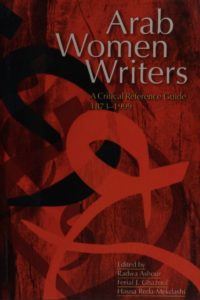
Zaynab Fawwaz: Writer and historian
Zaynab Fawwaz (1860(?)-1914(?)) was most likely born into a working-class family of Tibnin, Lebanon. Little is known about her early life, including her date of birth but most sources agree…
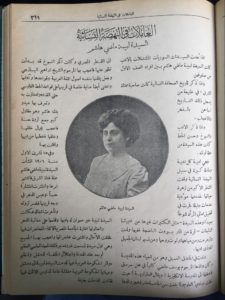
Labibah Hashim: Founder of the Fatat al-Sharq periodical
Labibah Hashim (1882-1952) founded Fatat al-Sharq in 1906. The monthly periodical was published from 1906-1929, with some sources dating its first issue back to 1900 . The publication advocated for…
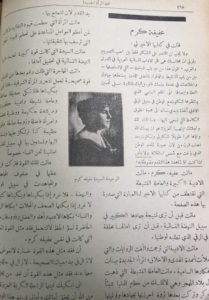
Afifah Karam: Author of Badi’ah wa Fu’ad, Advocating for Solidarity among women
Afifa Karam (1883-1924) spent her earlier years in Amchit, Lebanon, before moving to New York, USA, with her husband at the age of fourteen. She was a contributor to the…
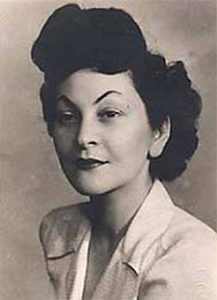
Malaka Saad: One of the first founders of women’s magazines in Lebanon
Malaka Saad was a critical writer, addressing the preoccupation of women in their looks and their lack of involvement in working alongside men. In 1908, she published the first edition…
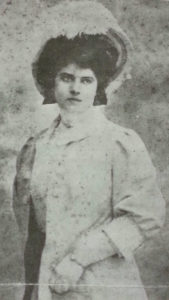
Mayy Ziyadah: A pioneering essayist, lecturer, literary critic, translator, and feminist
Although mistaken for an Egyptian, Mayy Ziyadah is a Lebanese-Palestinian poet who is mostly known for her cultural salon, which she started hosting in 1913 . The salon was a…
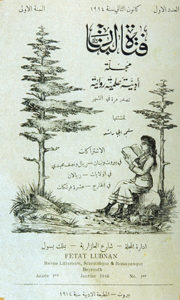
Salma (Salima) Abi Rashed: The first woman lawyer
Salma (Salima) Abi Rashed (1887/9-1919). Abi Rashed is renowned for becoming the first female lawyer in Lebanon. She also founded Fatat Lobnan in 1914, a monthly literary and academic magazine…
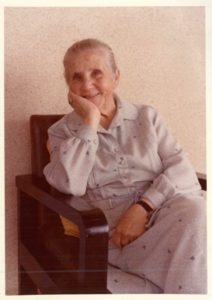
Anbarah Salam Khalidi: Feminist and Liberation organizer
Anbarah Salam Khalidi (1897-1986). Born into a large family of scholars and wealthy merchants, Anbara Salam would grow up to become known as a writer, translator, and feminist organizer. In…
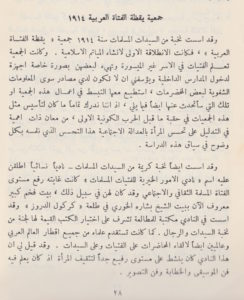
The Awakening of the Young Arab Women Association
In early 1914, a group of five women who called themselves the “granddaughters of Emir ‘Abd al-Qadir al-Jaza’iri” sent out invitations to prominent and young Arab feminists to attend the…
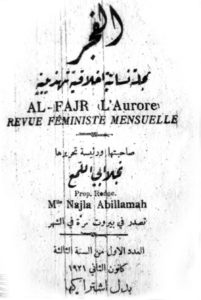
Najla Abillamah: Founder of al-Fajr
Najla Abillamah (1895-1970) founded the literary magazine Al-Fajr (The Dawn) in 1919. Al-Fajr was not exclusively open to women but emphasized women’s contributions and achievements. The publication of Al-Fajr lasted…
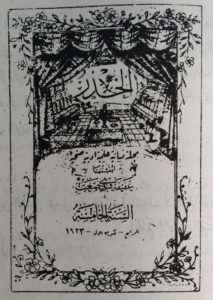
Afifah Saab: The founder of the first Druze women’s magazine
Afifah Saab joined the women’s magazines movement in Shouwaifat by establishing her magazine, al-Khidr (A Woman’s Chamber), a woman’s literary, scientific monthly magazine with an additional focus on health .…
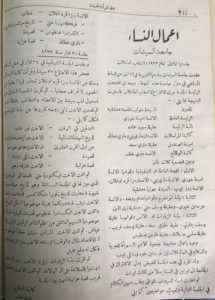
Formation of women’s unions and organisations
Beginning in the 1920s, women’s groups, associations, and organisations’ growing activism and advocacy for women’s social and political rights (right to vote and to run for elections) began to take…
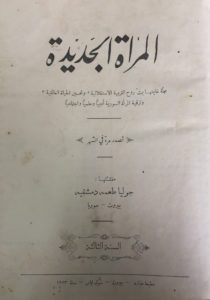
Julya Tu’mah Dimashqiyyah: One of the first leading women journalists in Lebanon
Born in the Mokhtara village, Mount Lebanon, Julya Tu’mah Dimashqiyyah is often referred to as the first woman journalist in Lebanon. She founded the monthly magazine al-Mar’ah al-Jadidah (The New…
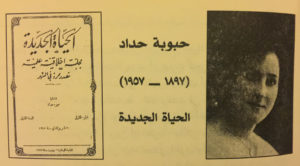
Habuba Haddad: Founder of al-Hayah al-Jadidah
Born in the Shouf, Mount Lebanon, Habuba Haddad quickly became one of the most esteemed women of her time; she was a writer, journalist, and an anchor . She founded…
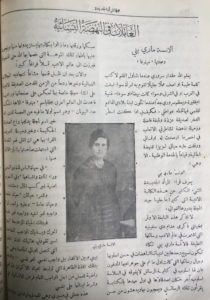
Mary Yanni: The founder of the Beirut-based magazine Minerva
Mary Yanni was one of the most notable women of her time. She established Minerva in 1923 in Beirut, publicising it as a magazine for “Literature, Art, and Sociology.” The…
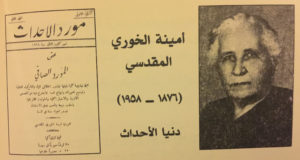
Aminah Khoury Makdisi: The Founder of Moured al-Ahdath
Another pioneering woman journalist from Tripoli, North Governorate, Aminah Khoury Makdisi launched her magazine, Moured al-Ahdath (The Events Provider), in 1923, in Beirut, publishing it until 1926 . The magazine…
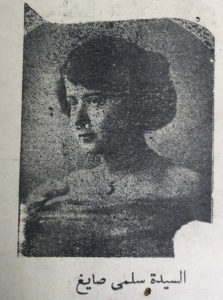
Salma Sayegh: A writer, a novelist, and feminist
Born and raised in Beirut, Salma Sayegh became one of the most renowned early writers, novelists, and feminists of the Nahda era in Lebanon. She contributed to the creation of…
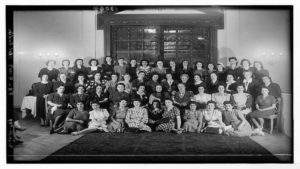
The Women’s Union in Lebanon and Syria
Though the formation of the Women’s Union in Lebanon and Syria started taking shape in 1920-1921, it was formally founded in 1924 to band together Lebanese women’s groups, associations,…
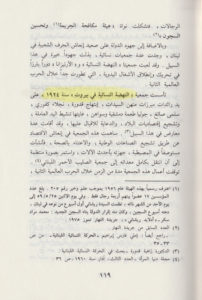
The Society for Women’s Renaissance
1924-1925 The Society for Women’s Renaissance was established was to advocate for equality between men and women; to sign, circulate, and submit petitions ; and to support Lebanon’s local economy and…
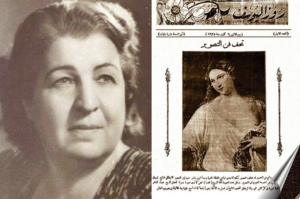
Fatima (Roz) Mohyeldin al-Youssif: The founder of Roz al-Youssif
Born in Tripoli and raised in Alexandria, Fatima (Roz) Mohyeldin al-Youssif became one of the most distinguished women in Egypt for her role in establishing the magazine Roz al-Youssif, a…
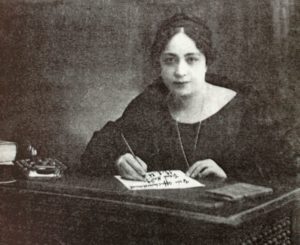
Hajjah Fatimah al-Rifai: A respected literary salon hostess
Among the many salons that sprouted in Lebanon, a lesser-known one was hosted by a Muslim woman called Hajjah Fatimah al-Rifai beginning in 1927. Though she was religious, al-Rifai hosted…
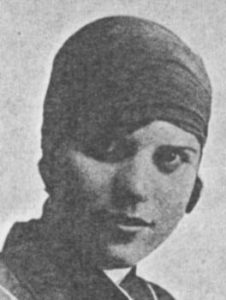
Nazira Zain al-Din: One of the first Islamic feminists
Nazira Zain al-Din was one of the first women to discuss the issues of women in Islam after studying Islamic doctrines in the Quran and hadith. She advocated for women’s…
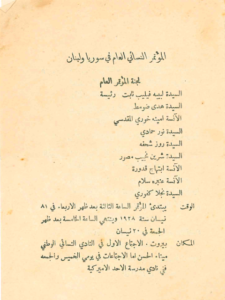
The first women’s conference in Beirut
59 – The first women’s conference in Beirut – Invitation of Conference – LCW 18 April 1928 – The first women’s conference held in Beirut was organised by the Women’s Union,…
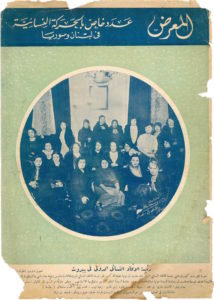
Bringing forward the agenda of women’s political participation
Despite political resistance, advancing women’s political roles and participation garnered the attention of pioneering women across the Arab region, with Lebanese women being at the forefront of this momentum. Not…
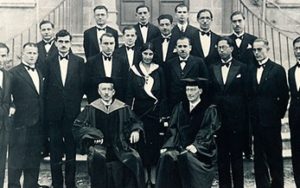
Edma Abouchdid: The first female physician in Lebanon
Edma Abouchdid was the first woman to graduate from the American University of Beirut with a B.A. in 1926, and was also the first woman to graduate from the Medical…
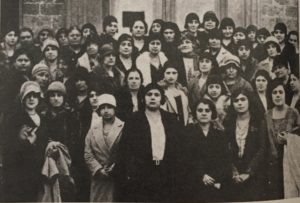
A plea for women’s political participation
During a parliamentary session, Deputy Sheikh Yussef Al Khazin requested that women be granted the right to vote; his request was supported by a mere three votes, and the bill…
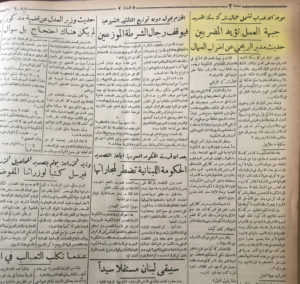
The fight against the Regie’s monopoly and colonial rule
The Regie Libanaise des Tabacs et Tombacs, commonly known as the Regie, was established, in 1935, as a monopoly over the tobacco industry in Lebanon and Syria. The emergence of…
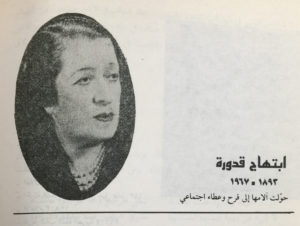
Ibtihaj Qaddoura: A leading women in the feminist movement in Lebanon
Ibtihaj Qaddoura’s journey with women’s movements and associations started in 1914 with the creation of the Awakening of the Young Arab Women Association along with other feminist contemporaries such as…
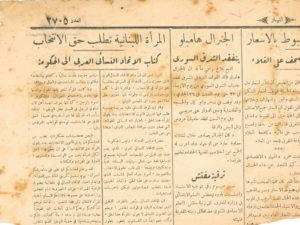
Demanding the right to vote and run for elections
Women capitalised on the Lebanese-French Agreement that stipulated equal civil and political rights to all citizens, and demanded their right to vote and run elections .
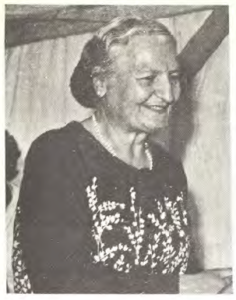
Zahiyah Maksad Salman: A child welfare and women’s rights advocate
Zahiyah Maksad Salman was an advocate of child welfare in Lebanon. Her activism led to “the establishment of day care centres across Lebanon as early as 1937.” Additionally, she was the…
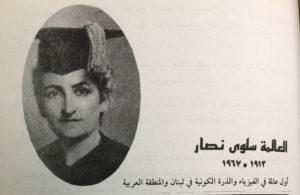
Salwa Nassar: The first woman physicist in Lebanon
Salwa Nassar was the first woman to enrol in the American University of Beirut’s Mathematics Department. Upon her graduation from AUB, she was awarded a scholarship from Smith College in…
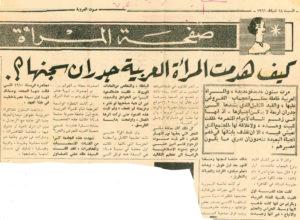
Post-independence and the first “wave” of feminism
Though Lebanese feminist activism emerged long before Lebanon’s independence in 1943, it gained momentum post-independence, making way for subsequent “waves” of feminism with different actors, demands, advocacy tactics, political discourses,…
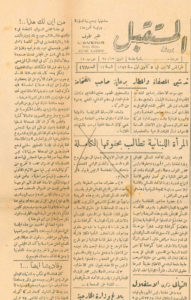
Women’s street-level mobilisation for independence and political rights
Women marched alongside men, demanding the release of Sheikh Bshara el-Khoury, Lebanon’s newly elected president post-independence; Prime Minister Riyad al-Solh; as well as other members of the Cabinet, from prison…
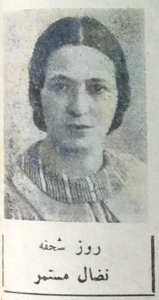
Rose Attallah Shahfah: A writer and advocate of women’s rights
Much like her contemporaries, Rose Attallah Shahfah was an active woman in the realms of writing and promoting women’s rights. She wrote for several magazines and newspapers of her time,…
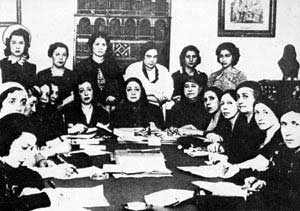
The first Arab Women’s Conference in Cairo
The First Arab Women’s Conference, which took place in Cairo under the leadership of Egyptian feminist Huda Sha’rawi, aimed at laying women’s claims to political participation instead of focusing on…
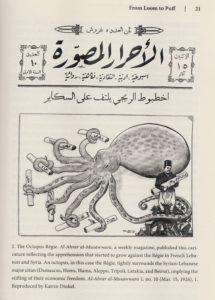
Ongoing protests by the Regie working women and men
The Regie Libanaise des Tabacs et Tombacs, commonly known as the Regie continued to be a French tobacco monopoly until 1960 when the management, “privileges, and properties” of the company…
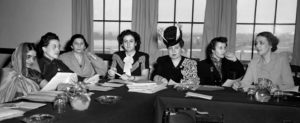
Angela Jurdak Khoury: Lebanon’s first woman diplomat
A graduate of the American University of Beirut in 1937, Angela Jurdak Khoury became AUB’s first woman instructor. She joined the diplomatic corps and acted as a Consul of Lebanon…
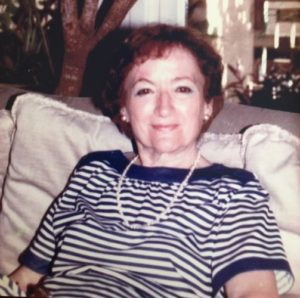
Edvick Jureidini Shayboub: The editor-in-chief of Sout al-Maraa
In 1945, the weekly newspaper Sout al-Maraa (Women’s Voice) launched its inaugural issue. Edvick Jureidini Shayboub became the newspaper’s editor-in-chief in 1951. The newspaper was specialised in women’s affairs, from…
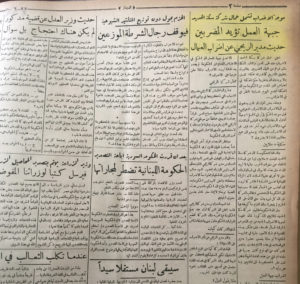
The Regie [tobacco] Company strike
In June 1946, men and women working at the Regie threatened to hold a general strike unless the administration agreed to their demands, which included wage increases and receiving long-term…
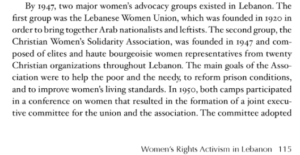
Additional institutionalisation of the feminist movement
Segregated along sectarian lines, the Lebanese Women Solidarity Association was founded to bring together elite women and haute bourgeoisie women representatives from 20 Christian organisations across Lebanon.
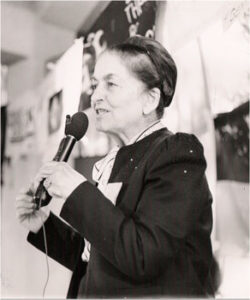
Anissa Rawda Najjar: A renowned rural women’s rights activist
Anissa Rawda Najjar was a lifelong advocate of rural women’s rights, her activism spanning over 45 years . In 1951, she established the Village Welfare Society (VWS) with Eveline Bostrous,…
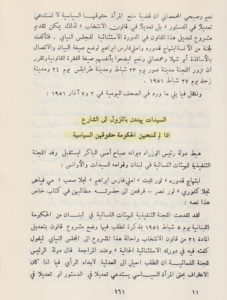
Marching to the Presidential Palace
The Executive Committee of Women Associations (ECWA) organised a march comprised of car convoys, which headed to the presidential palace.
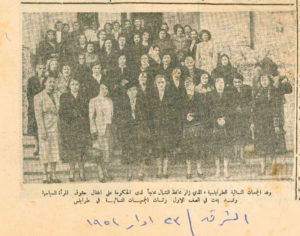
Demonstrations at the Lebanese Parliament
20 March 1951 – Women across all areas in Lebanon congregated in massive demonstrations in front of the parliament during the parliament’s weekly sessions in order to demand their political rights.…
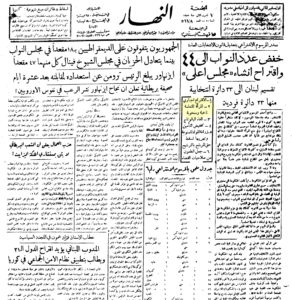
Political rights for educated women
4 November 1952 – President Camille Chamoun passed Decree no. 6, which stated that women educated at the primary level or holding equivalent certificates were granted the right to vote…
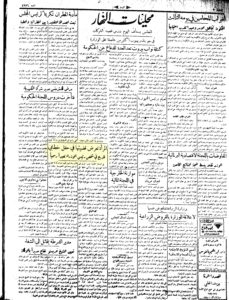
The Roxy Movie Theatre Demonstration
1 January 1952 – All of the women’s groups in Lebanon gathered at the Roxy Movie Theatre under the auspices of the First Lady to demand full suffrage.
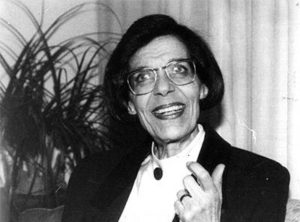
Laure Moghaizel: An outstanding activist and women’s rights advocate
As an influential figure in the Lebanese feminist movement, Laure Moghaizel’s accomplishments and contributions are countless. She was a founding member of many associations and organisations concerned with women’s rights…
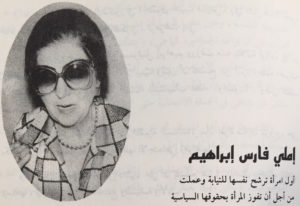
Emily Fares Ibrahim: The first woman to run for Parliament
Between 1953 and 1975, Lebanon had six parliaments: the 8th Parliament (1953-1957), the 9th Parliament (1957-1960), the 10th Parliament (1960-1964), the 11th Parliament (1964-1968), the 12th Parliament (1968-1972), and…
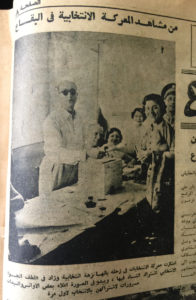
Political rights for all women
18 February 1953 – More legal reforms were implemented and stipulations promoting gender equality were laid down in Decree no. 37. The provisions in Article no. 2 of the decree gave…
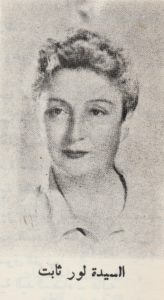
Women in the second parliamentary elections (pre-Civil War)
152_Women in the second parliamentary elections (pre-war) – Laure Tabet _Annahar Archives During the second parliamentary elections held from 9 to 23 June 1957, Laure Tabet ran for the…
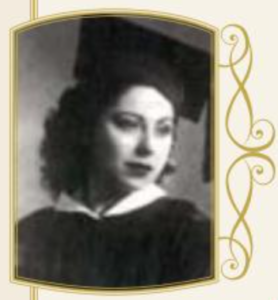
Zahiya Kaddoura Kaffafi: A prominent critical academic and activist
Zahiya Kaddoura Kaffafi was a critical academic and historian of Lebanon as well as of women’s movements. She was among the few women activists to openly “oppose the French Mandate…
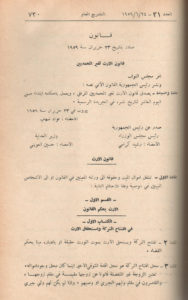
Personal status laws no longer regulate inheritance for non-Muslim confessions
12 – Personal status law no longer regulates inheritance for non-Muslims – قانون الإرث لغير المحمديين BAU JR Since Lebanon has no unified family law system, the religious courts of…
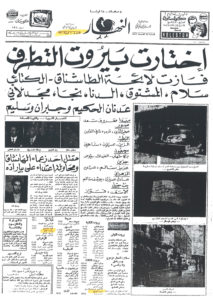
Women in the third parliamentary elections (pre-Civil War)
For the third parliamentary elections held from 12 June to 2 July 1960, two women ran for elections. The first was Munira al-Solh, the first woman to run for…
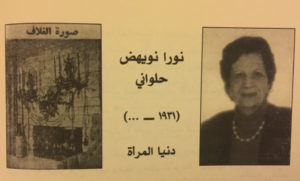
Noura Nowayhed Halawani: The Founder of Donia al-Maraa
Noura Nowayhed Halawani launched Donia al-Maraa (The Woman’s World) in 1960. The magazine focused on a wide array of women’s issues, from women’s political rights to the challenges they face…
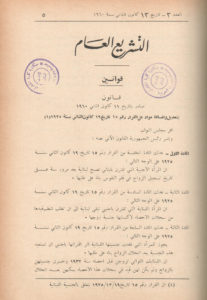
Foreign women could obtain Lebanese citizenship
Article 1 of Law no. 15 issued in 1925 stipulated that the Lebanese nationality is to be passed through a) patrilineal/paternal line (having a Lebanese father); b) the right of…
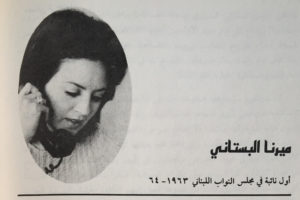
Myrna Boustany: The first woman Parliamentarian
143_First woman parliamentarian – Myrna Boustany_ANNAHAR ARCHIVES Even though women started running for parliamentary elections beginning in 1953, the majority of them lost the elections to male rivals. During the…

Women in the fourth parliamentary elections (pre-Civil War)
154_Women in the fourth parliamentary elections (pre-war) – Ibriza al-Meoushi and Munira al-Solh_Annahar During the fourth parliamentary elections held from 5 April to 3 May 1964, two women ran…
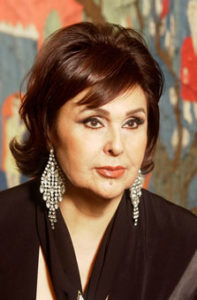
Nidal al-Ashkar: A renowned cultural figure
Nidal al-Ashkar was among the most influential women to shape the cultural landscape of Lebanon and the Arab world. Much of the development of theatre in Beirut is attributed to…
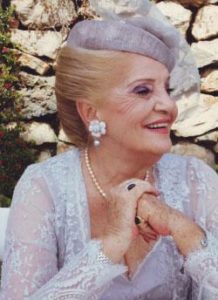
Emergency elections
After the death of Parliamentarian Antoine Sa’eed, his wife, Nuhad Sa’eed ran for a Maronite seat in Byblos district, but lost with 9,544 out of 20,420 votes .
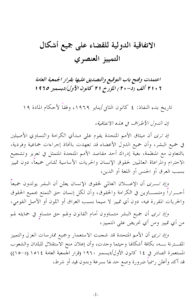
Right of choosing citizenship
14 – Right of Choosing Citizenship_UN.pdf Lebanon became signatory of the International Convention on the Elimination of All Forms of Racial Discrimination. Article 5 of the convention grants citizens (both…
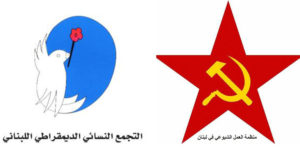
A Split off
Leftist feminist organisations separated themselves from the Lebanese political parties that once incubated them, becoming autonomous. In other words, they formed their own independent structures and entities. This separation set…
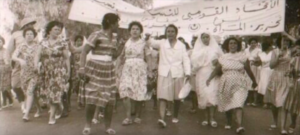
Second generation of feminists
After the Arab defeat in the Six-Day War, a second cycle of Lebanese feminism emerged. The disappointing defeat elicited a critique of nationalist ideologies and gave rise to leftist feminism.…
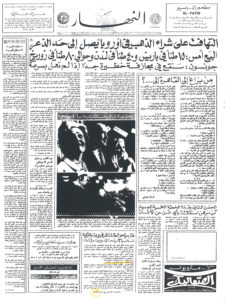
Women in the fifth parliamentary elections (pre-Civil War)
During the fifth parliamentary elections held from 24 March to 7 April 1968, two women ran for the elections. The first was Munira al-Solh who ran again for the…
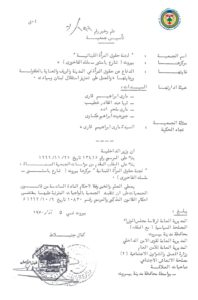
Legal recognition of the League for Lebanese Women’s Rights
Despite advocating for women’s rights in rural Lebanon since 1947, the leftist League for Lebanese Women’s Rights became legally recognized in 1970. It sought to promote women’s political participation, lobby…
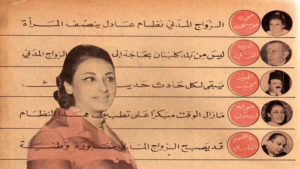
Campaigning for the abolishment of the personal status law
In the absence of a unified family law system in Lebanon, religious courts predominantly oversee the application of personal status laws with little governmental oversight. The religious courts of 18…
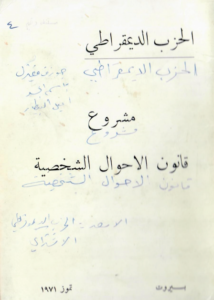
A bill for a unified personal status law
82_A bill for a unified personal status law_Chaml The Lebanese Democratic Party attempted to pass a bill to establish a “unified personal status law,” to no avail. This provided a…

Women in the sixth parliamentary elections (pre-Civil War)
For the sixth parliamentary elections held from 16 to 30 April 1972, four women ran for the elections. The first was Nuhad Sa’eed, who ran for the third time…
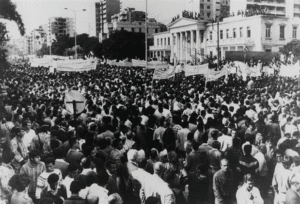
Working women and men strike for their rights at al-Ghandour Factory
Al-Ghandour factory, which produces biscuits and candy, had a notorious reputation for mistreating workers. Like the Regie, al-Ghandour factory had a high percentage of working women who were discriminated against…
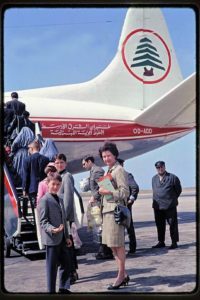
Acquiring the right to travel without spousal permission
Lebanese women gained the right to travel without their husbands’ permission, a tradition that was spread at the time, especially in rural areas. Nevertheless, Lebanese husbands have the right to…
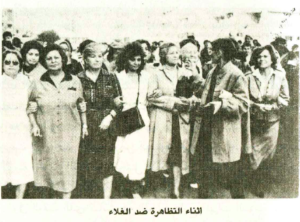
Women take to the streets against economic policies and rising prices
On 30 November 1974, women’s groups, committees, and organisations (including the League for Lebanese Women’s rights) protested the country’s deteriorating economic situation and the rising prices. They were joined by…
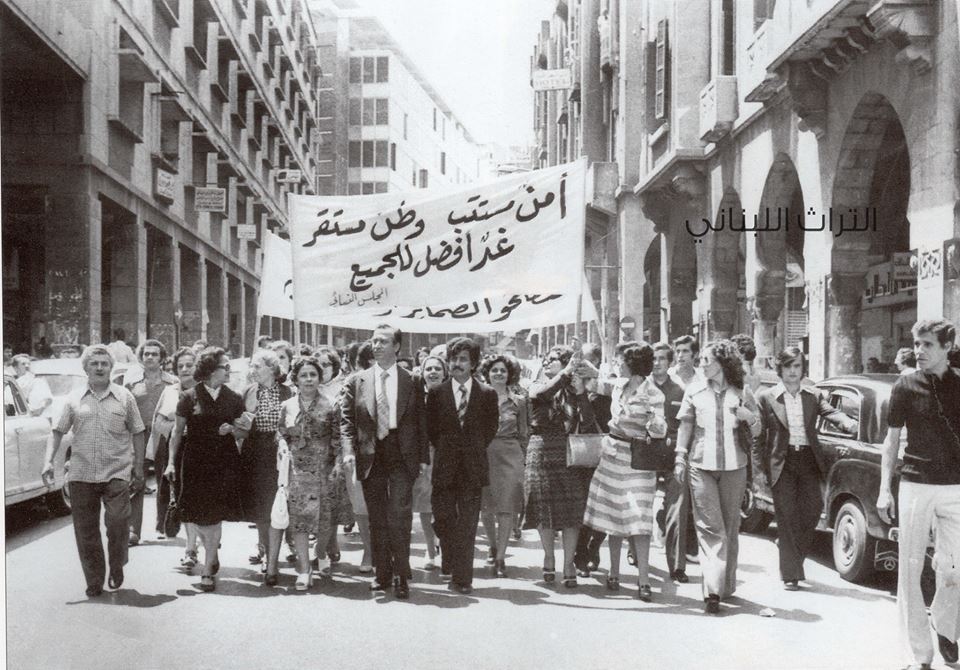
Lebanese Civil War
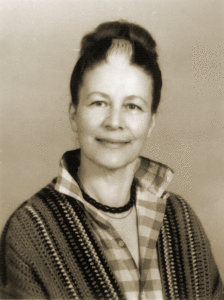
Insaf Laawar Modaad: An active writer and advocate of women’s rights
Insaf Laawar Modaad was a journalist whose work and writing actively addressed women’s rights. She wrote to the Lebanese Council for Women in 1975 raising the demands of women in…
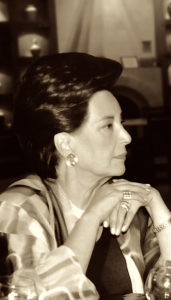
Khola Arsalan: An aid activist
Khola Arsalan was among the most active women concerned with healthcare during the Lebanese Civil War. She founded a medical committee that toured Lebanese hospitals to provide medicine and treatment…
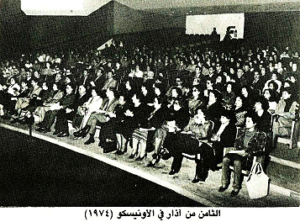
Local and international meetings and conventions to advance (Lebanese) women’s rights
85_Local and International Meetings and conventions to advance (Lebanese) women’s rights_Al Raida Magazine – Women, a Human Resource of Development in the Arab World – May 1976 – Issue 1…
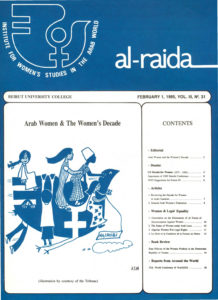
The World Conference on Women, Mexico City
86_89 alraida-31 The United Nations organised the World Conference on Women to initiate a dialogue on equality between third world feminists and their western counterparts. A delegation represented Lebanese women…
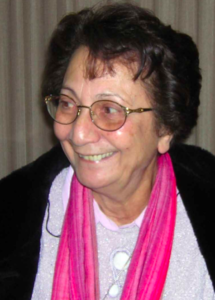
Wedad Shaktoura: Founder of the Lebanese Democratic Women’s Gathering (RDFL)
Not only was Wedad Shaktoura a pioneering women’s rights activist, but she was also a leader at the Communist Action Organisation in Lebanon. She worked with professional syndicates in Lebanon…
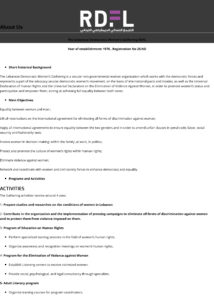
Founding the Lebanese Women Democratic Gathering
The Lebanese Women Democratic Gathering (RDFL) was established under notice 25/A.D. with the aim of cooperating with democratic forces to achieve full gender equality, and combat violence. It utilised international…
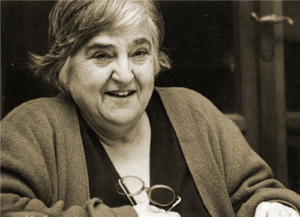
Etel Adnan: A prolific writer and intellectual
Born in Lebanon in 1925 to a Greek mother and a Syrian father, Etel Adnan is a writer and painter whose work navigates multiple identities, languages, and cultures. She writes…

Lebanon ratified the International Labour Organisation (ILO) conventions promoting women’s employment and protection of their working conditions
17_ Lebanon ratified ILO Conventions promoting women’s employment and protection of their working conditions_JR Lebanon ratified ILO convention no. 100 on equal remuneration between men and women; ILO convention no.…
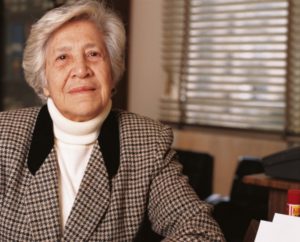
Linda Matar: A lifelong women’s rights advocate
Linda Matar became engaged in the public sphere from her early childhood and teenage years. She worked at silk factories, where she witnessed first-hand the unequal treatment of young women…
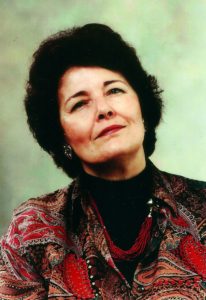
Emily Nasrallah: An acclaimed Lebanese writer
Emily Nasrallah (1931-2018) was one of the most famous writers in the Arab world, as well as passionate women’s rights activist who worked towards documenting the women’s rights movement and…

Legalisation of contraception
20 – Legalization of contraception – تعديل قانون العقوبات (إجهاض) 1983 BAU JR Contraceptive methods were illegal, and their prescription, promotion, or sale were sanctioned by provisions in the Penal…
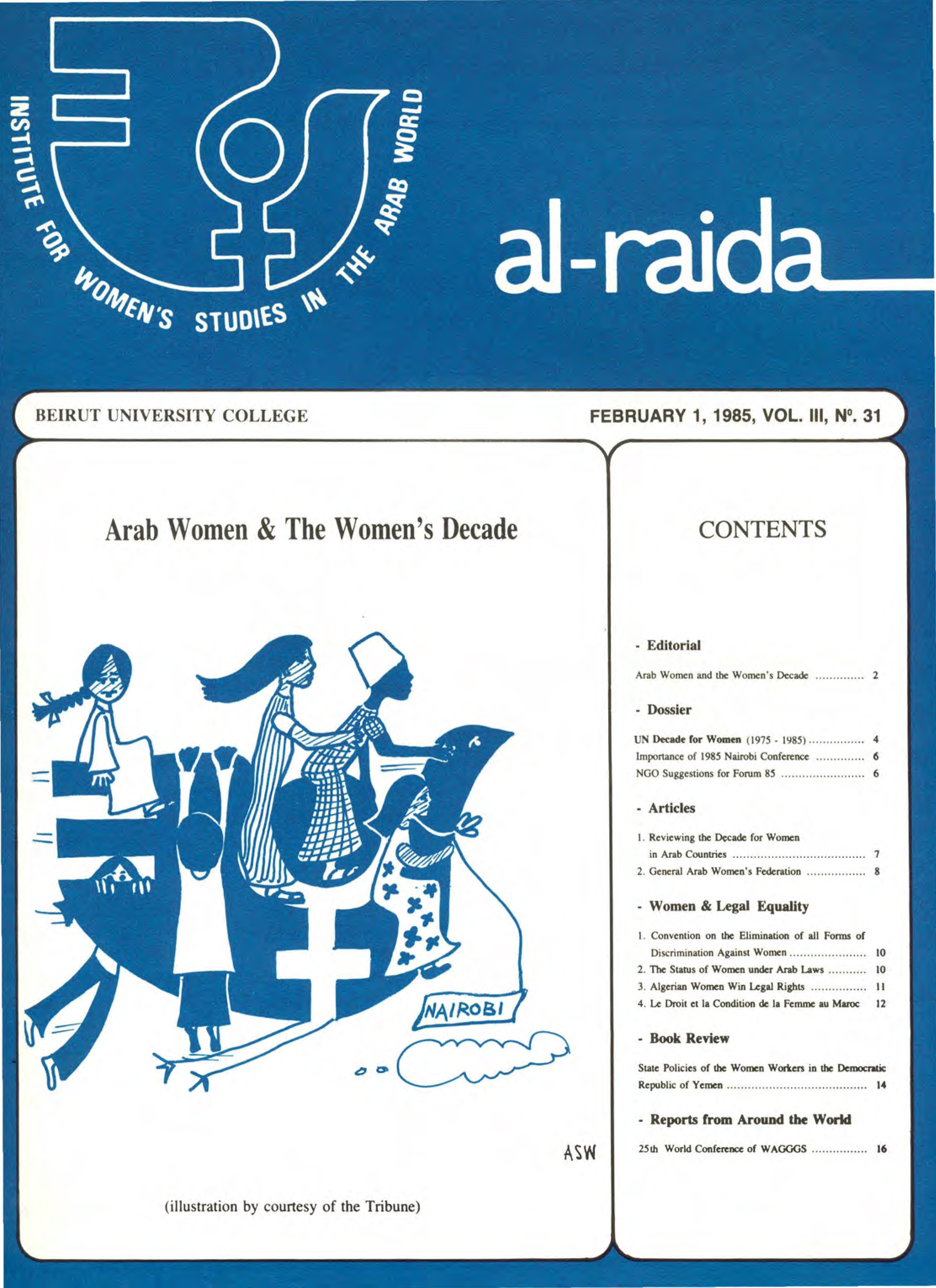
The third World Conference on Women
The third World conference to Review and Appraise the Achievements of the United Nations Decade for Women was held in Nairobi, Kenya with the aim of bringing representatives of different…
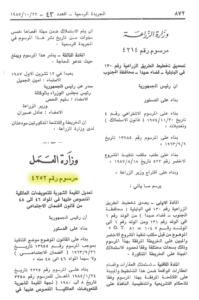
Women and the right to state benefits
21_Women and the right to state benefits_JR It was only in 1987 that women gained equal accessibility to social benefits previously exclusive to men. The amendments made to the legislation…
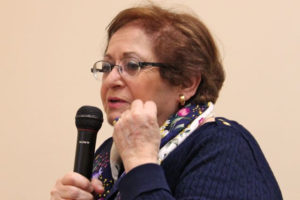
Jean Said Makdisi: A writer, feminist, and historian
In her memoir, Beirut Fragments: A War Memoir (1990), Jean Said Makdisi depicts life in war-torn Beirut. She describes neighbourhoods, buildings, and streets, exploring how each of these constructs contributes…

Jumana Merhi: A contemporary women’s rights activist
Jumana Merhi is the director of the Arab Institute for Human Rights in Lebanon, and the vice president of The Lebanese Democratic Women’s Gathering. She has been involved in advocating…
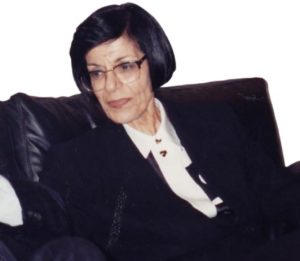
Giving precedence to international treaties
Article 2 of the Lebanese Code of Civil Procedure, issued in 1983, necessitates that Lebanese courts adhere to the hierarchy of legal rules, which requires them to give international treaties…
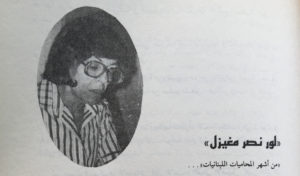
Campaigning for the supremacy of international human rights treaties over domestic laws
27 June 1990 – Alongside the Lebanese Women Democratic Gathering’s lobbying for the use of international conventions domestically, feminist activist Laure Moghaizel, together with a delegation from the Human Rights Association,…
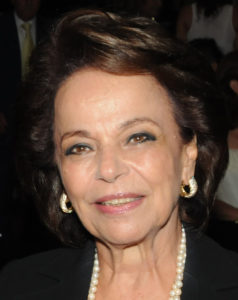
Nayla Moawad: The second woman in Parliament
Nayla Moawad was appointed to parliament in 1991, shortly after her husband became president.
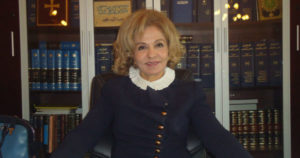
Bushra al-Khalil: the first Shi’a woman to run for parliamentary elections in the South district
Bushra al-Khalil was the first Shi’a woman to run for parliamentary elections in the South district. However, she lost the elections.
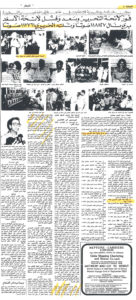
Women in the first parliamentary elections
The first regular parliamentary elections after the Lebanese Civil War took place from 23 August to 11 October 1992, and six women ran for seats. Three out of those…
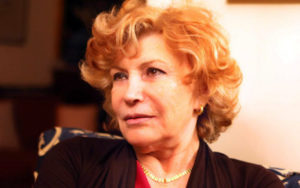
Fahima Charafeddine: A feminist researcher and a fierce advocate of women’s rights
Dr. Fahima Charafeddine is an independent researcher and a longtime advocate of women’s rights. She has analysed the women’s movement in Lebanon, and is critical of the mainstream narrative about…
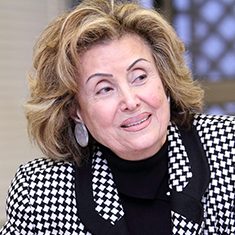
Nimat Asaad Kanaan: The first woman general director for the Ministry of Social Affairs
Nimat Asaad Kanaan became the first woman general director of the Ministry of Social Affairs, occupying the position from 1993 to 2005. She headed many national projects, including the Project…
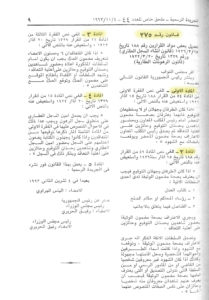
Right to testify at the notary
Women gained the right to testify in matters related to land registry. In 1993, Article 54 of the Land Registry Law, which confined the testimony at the notary to men,…
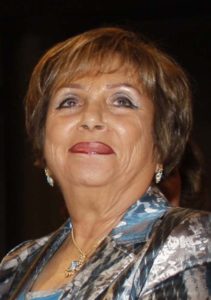
Iqbal Doughan: An ardent advocate for women’s labour rights
Iqbal Doughan is a women’s rights activist, and is currently the president of the Working Women League in Lebanon. As a labour lawyer, she was the first woman director of…
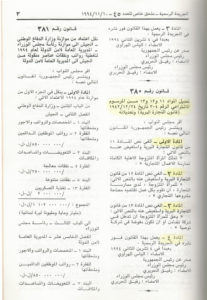
Obtaining the right to trade without spousal permission
Married women acquired the right to trade without the permission of their husbands.
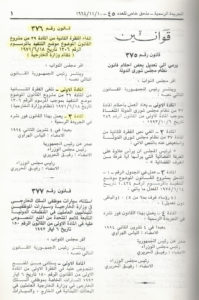
Acquiring the right to pursue a career in diplomacy
According to the 1971 regulatory law of the Ministry of Foreign Affairs, Article 39 forced Lebanese women diplomats to leave their jobs should they marry a foreigner. In 1994, Law…
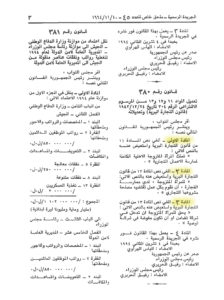
Married women and the right to operate a business
Women were granted the right to enter commercial businesses, partnerships, and limited liability companies after the revocation of Articles 11, 12, and 13 of the Trade Law of 1942. These…

Gaining legal competence in life insurance contracts
27_Gaining legal competence in life insurance contracts_JR Women were granted the legal competence to enter life insurance contracts when article 997 of the Law of Obligations and Contracts was amended.…
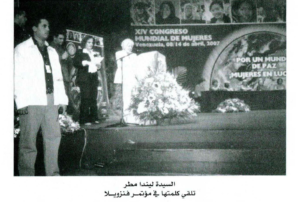
Third Cycle of Feminism
Following the fourth World Conference on Women in Beijing, a third generation of feminists emerged in Lebanon. This generation helped in formulating new terms, such as “gender-based violence,” “full citizenship,”…
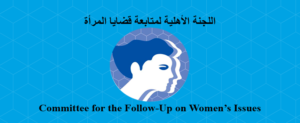
The NGOisation of the feminist movement
Mid-1990s – International organisations’ efforts pushed the Lebanese government to partner with women’s organisations to facilitate the provision of social welfare services and reshape “the future of gender relations in the…

Women in the second parliamentary elections
146 _ Women in the second parliamentary elections – Nayla Moawad Bahiya al-Hariri Nuhad Sa’eed _ Annahar Archives In the second parliamentary elections, held from 8 August to 15 September…
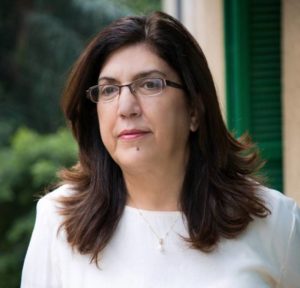
Zoya Jureidini Rouhana: A contemporary advocate of gender-based violence
Inspired by the activism she witnessed during the Lebanese Civil War, Zoya Jureidini Rouhana decided to dedicate her efforts to advocating for gender-based violence. In so doing, she became one…
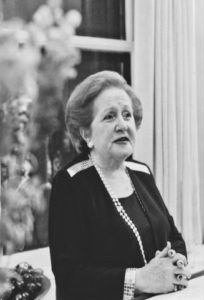
Mona Chemali Khalaf: A staunch women’s rights advocate and a distinguished economist
Not only was Mona Chemali Khalaf (1939-2018) an academic, but she was also a long-time activist and advocate of women’s rights in Lebanon. Her research and advocacy focused on gender…
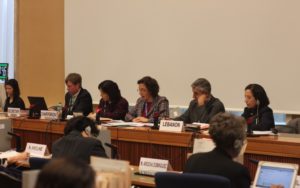
Signing and ratifying CEDAW
28_Signing and ratifying CEDAW_Certified Official Copy of CEDAW – Ch_IV_8p 28_Signing and ratifying CEDAW_CONVENTION ON THE ELIMINATION OF ALL FORMS OF DISCRIMINATION SIGNATORIES 28_Signing and ratifying CEDAW_Treaty Series –…

The “My country, my town, my municipality” nationwide campaign
Launched by the Lebanese Association for Democratic Elections (LADE) in 1997 to advocate the holding of municipal elections on time, the campaign baladi, baldati, baladiyati (My country, my town,…
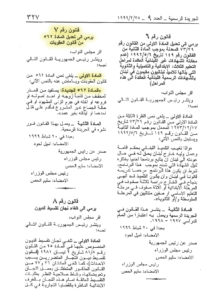
Amending Article 562 from the Lebanese Penal Code
20 February 1999 – Article 562 of the Lebanese Penal Code stipulated an exemption from punishment in what is known as “honour crimes.” Honour crimes are committed by male figures, such…

“My nationality is a right for me and my family”: Fighting for inclusive citizenship for women
Article 5 of decree no. 15, passed in 1925, was amended to allow foreign women to become Lebanese citizens if they are married to Lebanese men. Lebanese women, on the…
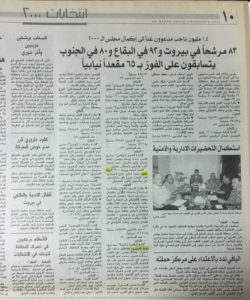
Women in the third parliamentary elections
The third parliamentary elections were held from 27 August to 3 September 2000 . The electoral campaign was described as “the most corrupt” since the end of the Civil War.…
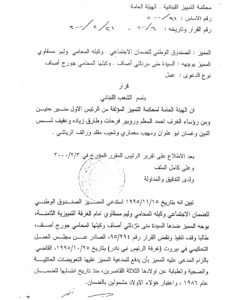
Providing equal maternity leave and family allowance for men and women
31 – Equalising maternity leave and family allowance for men and women -www.legallaw.ul.edu.lb .pdf In February 2000, the Supreme Court issued a resolution equalising insured individuals (men and women) with…
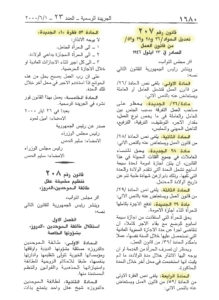
Providing equal working conditions for men and women in the public and private sectors
26 May 2000 – A number of articles in the Lebanese Labour Law were revoked and amended to achieve equal working conditions for men and women working in the public sector.…

Fourth generation feminism
Beginning in the early 2000s, sexual, reproductive, and bodily rights were at the heart of the fourth generation of feminists that was emerging in Lebanon. This came in…
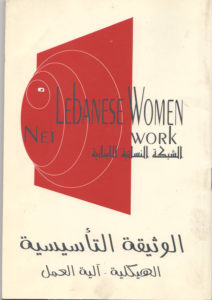
Establishing the Lebanese Women’s Network
Headed by the Women’s Democratic Gathering and with 13 feminist organisations under its auspices, the Lebanese Women’s Network was established in 2001 with the aim of propagating complete gender equality.
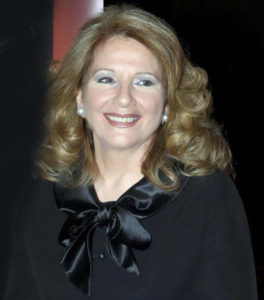
Leila al-Solh: The first woman to be appointed Minister of Industry
Leila al-Solh (daughter of former Prime Minister Riyad al-Solh) was the first woman to be appointed Minister of Industry from 2004 to 2005.
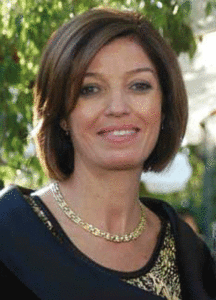
Wafaa Hamza: The first woman to be Minister of State the Parliamentary Affairs
Wafaa Hamza was the first woman to be appointed, alongside Leila Al Solh in the same cabinet, as Minister of State for Parliamentary Affairs.
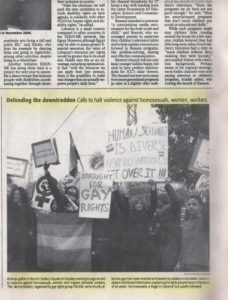
A proliferation in organisations advocating LGBTIQ, sexual, and bodily rights
With the establishment of Helem in 2004, the first LGBTIQ organisation in Lebanon and the region, many organisations focusing on sexual diversity and rights followed suit. Helem was conceived out…
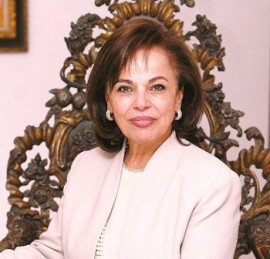
Nayla Moawad: The first woman to be appointed Minister of Social Affairs
Nayla Moawad was the first woman to be appointed as the Minister of Social Affairs from July 2005 to July 2008 in the cabinet of Prime Minister Fouad Siniora and…
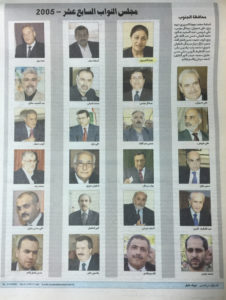
Women in the fourth parliamentary elections
The fourth parliamentary elections, held from 29 May to 19 June 2005, ended with six women winning seats, which is considered the highest level of participation of women in the…
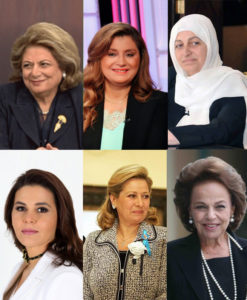
The highest representation of women in parliamentary elections
Women’s level of representation at the 2005 parliamentary elections was the highest in the history of modern Lebanon, with 6 women out of 128 parliamentarians being elected – the equivalent of…
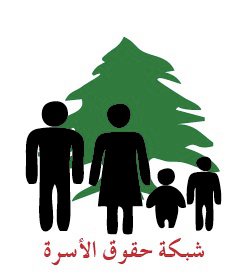
13/15 campaign
Many NGOs joined the fight against confessional personal status laws, which are seen as a hurdle for the creation of national rules to protect vulnerable persons. As a manifestation of…
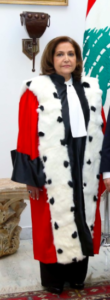
Feryal Daloul: ِThe first woman to be appointed to the Supreme Judicial Council
Feryal Daloul became the first woman to be appointed to the Supreme Judicial Council. In 2006, then-Prime Minister Fouad Siniora approved the appointment of five new judges; Daloul was…

A bill to for a 30% quota for women in the Parliament
Despite representing 51% of the Lebanese population and 54% of university graduates, it is rare to find women in the Lebanese Parliament and public offices, of which men constitute 97%.…

Meem
Meem, a group that split off from Helem, became independent with a focus on non-political and non-religious issues.
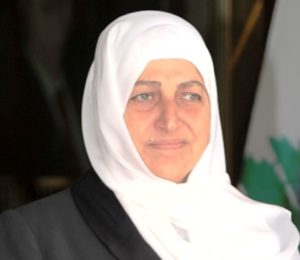
Bahiya al-Hariri: The first woman to be appointed Minister of Education and Higher Education
Bahiya al-Hariri was the first woman to become the Minister of Education and Higher Education. Al-Hariri was also among the first women to win seats in the Parliament from 1992…
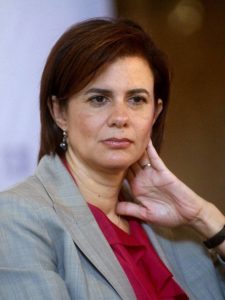
Raya Haffar el-Hassan: The first woman to be appointed Minister of Finance
Raya Haffar el-Hassan was the first woman to be appointed Minister of Finance from 2009 to 2011. Prior to her appointment, she acted as an advisor to the Minister of…
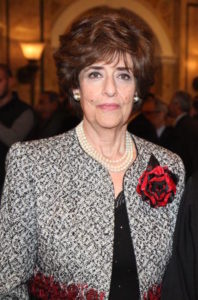
Mona Ofeich: The first woman to be appointed State Minister for Women and Children
Lawyer and civil society activist Mona Ofeich was the first woman to be appointed State minister for Women and Children. She is considered to be an independent diplomat (unaffiliated to…
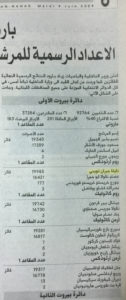
Women in the fifth parliamentary elections
The fifth parliamentary elections took place on 7 June 2009 and ended with four women candidates winning seats. They included: Nayla Tueni (daughter of Gebran Tueni), Setrida Geagea, Bahiya al-Hariri,…

The short-lived victory of Samira Soueidan
Samira Soueidan was the first Lebanese woman to pass her Lebanese nationality to her children from her deceased Egyptian husband . The court, led by judges John Qazzi, Rana Habka,…
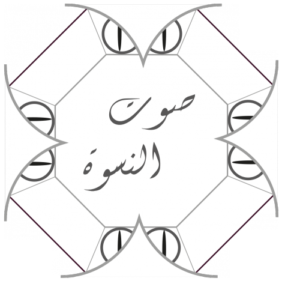
Launching of Sawt al-Niswa, a feminist knowledge production platform
101 – A knowledge production platform – صوت النسوة website Sawt al-Niswa was founded as a non-partisan feminist network and platform for theorisation and knowledge production. The network includes feminist…

Improving the status of Palestinians refugees in legal codes
37_Improving the status of Palestinians refugees in legal codes_JR In September 2010, Article 59 of the Lebanese Labour Law was amended to grant Palestinian refugee workers, both men and…
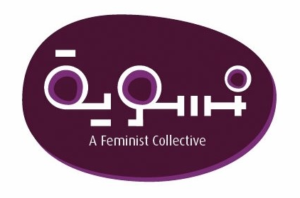
Nasawiya, a grassroots young feminist collective
After the Feminist Collective fell apart, another feminist group, Nasawiya, was created with a focus on self-empowerment, “identity politics,” and mutual support. The grassroots collective was not linked to any…
Fighting racism
The Anti-Racism Movement (ARM) was created as a grassroots movement of activists and feminists, along with migrant workers and migrant domestic workers. The collective was born after a notorious discriminatory…
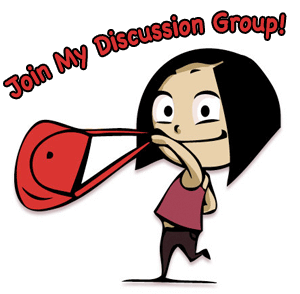
The Adventures of Salwa, a grassroots campaign against sexual harassment
Launched by a group of young feminist activists, The Adventures of Salwa campaign was built around Salwa, a 2D animated character who uses her red bag to fight sexual harassment…
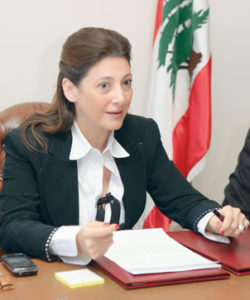
Amale Haddad: The first woman president of the Bar Association
Since its establishment in 1919, the Bar Association did not see a woman in any of its top leadership positions until 2011, when Amale Haddad became the first woman to…
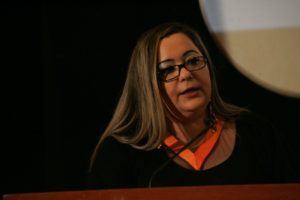
Ghida Abdallah Anani: The Founder of ABAAD Resource Centre for Gender Equality
In 2011, Ghida Abdallah Anani founded ABAAD Resource Centre for Gender Equality, a Lebanon-based civil society organisation that promotes “sustainable social and economic development in the MENA region” by empowering…
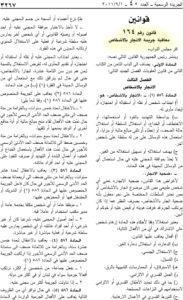
Promulgation of Law no. 164 which criminalises people-trafficking
49 – Law 164 human traficking JR 1 September 2011 – A law penalising the crime of people-trafficking was issued. The law had significant implications for forced labour in Lebanon, of…
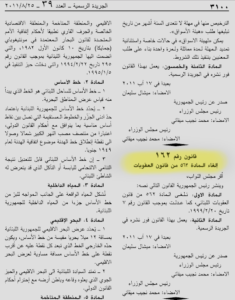
Abolishing the legal codification of “honour crimes”
Though honour crimes are not prevalent in Lebanon, 66 honour crimes were reported between 1999 and 2007 according to a study conducted by the organisation Kafa (Enough Violence and Exploitation).…

Raising the age of maternal custody in Sunni confessions
42 Raising the age of maternal custody in Sunni confessions JR Since Lebanon lacks a unified civil personal status code, maternal custody remains one of the many contentious areas governed…
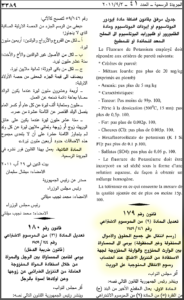
Equalising men and women in inheritance fee-related exemptions
Article 9 of Law no. 149 issued in 1959 was amended to ensure equal rights for both men and women in relation to the reduction of the fees incurred on…

Equalising women and men in income tax reductions
41 Equalising women and men in income tax reductions JR. Article 31 of Law no. 144 issued in 1959, which stated that only men had access to reductions on income…
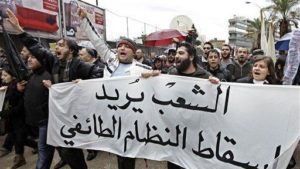
“The people demand the fall of the confessional system” mobilisation movement
27 February 2011 – The Lebanese youth marched against the confessional system upon which Lebanon is based, since it is seen as a major impediment towards gender equality and full…
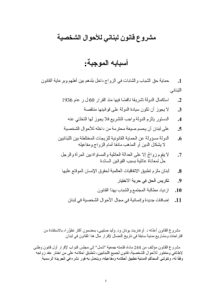
Re-launching the debate over the personal status law
109_Relaunching the debate over the Personal Status Law_ مشروع قانون لبناني للأحوال الشخصية – شمل KAFA (enough) Violence & Exploitation initiated a campaign for personal status laws by calling for…
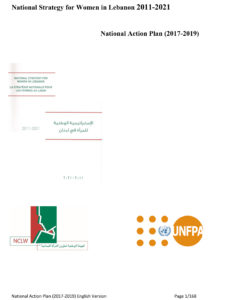
The National Strategy for Women in Lebanon (2011-2021)
44 – National Strategy for Women in Lebanon 2011-2021 _ NCLW.pdf The Lebanese government adopted the National Strategy for Women in Lebanon (2011-2021), which includes social, economic, political, legal,…

The fight for the establishment of civil marriage
Though civil marriages performed outside Lebanon are legally recognised in the country, officiating a civil marriage contract on Lebanese soil is illegal. Progress on the issue oscillated, however. After a…
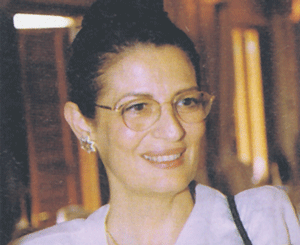
Alice Chabtini: The first woman to be appointed Minister for Displaced Persons
Alice Chabtini was the first woman to be appointed Minister for Displaced Persons. Prior to her appointment, she served as a judge and was the head of the Military Court…
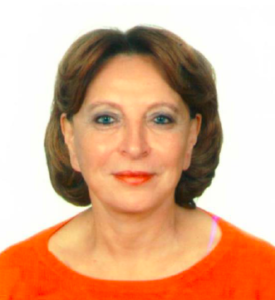
Maysem el-Noewri: The first woman to be appointed General Director of the Ministry of Justice
Maysem el-Noewri was the first woman to be appointed as General Director of the Ministry of Justice.
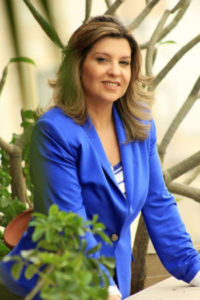
Nadine Moussa: The first woman to run for presidency in Lebanon
Nadine Moussa was the first woman to run for presidency in Lebanon in the 2014 elections.

Bahia Baalbaky: A pioneering activist in the Secondary Schools Teachers’ Association
Bahia Baalbaky’s activism started taking shape upon the 1967 resignation of the Egyptian President Gamal Abdel Nasser, the ideologue of Arab nationalism. Baalbaky took part in a protest against his…

Extending maternity leave for women
32 – extending maternity leave for women JR 22 April 2014 –While the International Labour Organisation requires a standard minimum of 12 weeks of maternity leave, maternity leave in Lebanon…
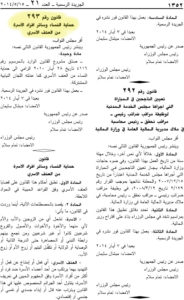
Issuance of Law no. 293 for the Protection of Women and Family Members from Domestic Violence
15 May 2014 – Thanks to the lobbying and persistent efforts of women’s organisations and activists, a law criminalising domestic violence, and promoting the protection of women and family members from…
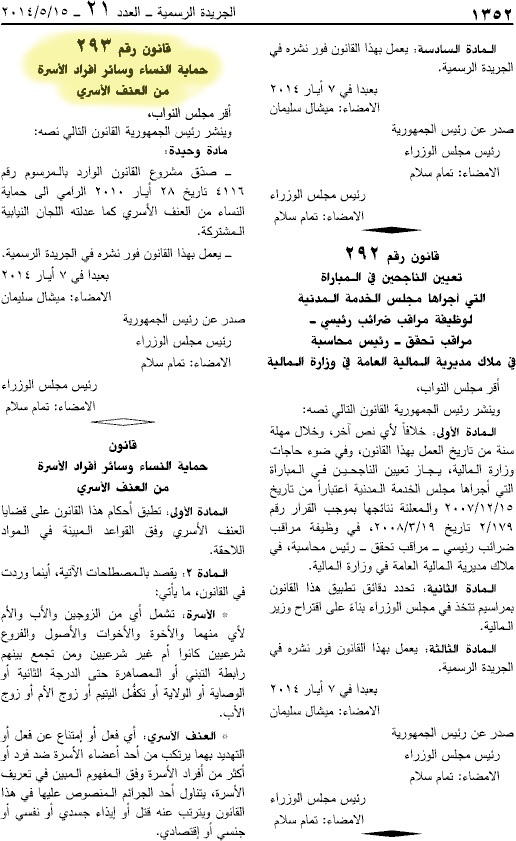
Amending the clauses on adultery in the Lebanese Penal Code
15 May 2014 – Article 3 of Law no. 293 stipulated the amendments of Articles 487, 488, and 489, which discriminated against women with regards to adultery. The penalty for…

“Anti-prostitution” social media campaign “Al Hawa Ma Byinshara”
The “anti-prostitution” campaign “Al Hawa Ma Byinshara” (“Sex/love” cannot be bought) was launched by Kafa in September 2014. According to Kafa, “prostitution” in Lebanon and globally is not a choice…
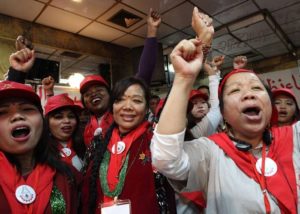
The first general assembly for the Syndicate of Men and Women Domestic Workers
25 December 2015 – The efforts of two years resulted in the establishment of the Syndicate of Men and Women Domestic Workers. The syndicate’s assembly was faced with resistance from…
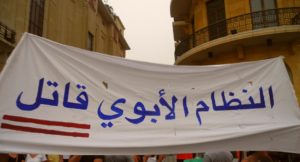
“The patriarchal regime kills”
Women’s participation in the Popular Movement (al-Hirak) in Lebanon, as well as the mobilisation movement that took place in 2015 to demand a solution for the garbage crisis that plagued…
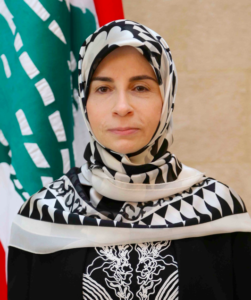
Enaya Ezzedine: The first woman to be appointed Minister of State for Administrative Development
Enaya Ezzedine was the first woman to hold the position of Minister of State for Administrative Development.
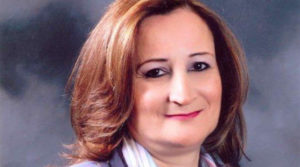
Wafaa Abed: An advocate of women’s participation in politics
Wafaa Abed is an outspoken advocate of the involvement and participation of women in political parties in Lebanon. She also advocates for the implementation of fairer legal codes for women,…
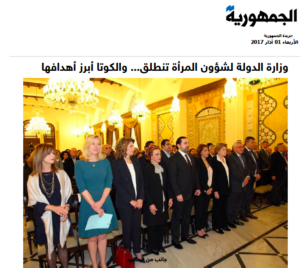
Creation of a Ministry of Women’s Affairs
50 – Creation of a Ministry of Women’s Affairs – Al Jamhouriya The National Commission for Lebanese Women was established in 1996, under the auspices of the government, to carry…
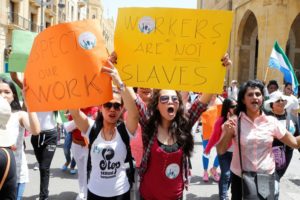
Labour Day marches by domestic workers
May 1, 2016 –Domestic men and women workers, along with civil society organisations, marched on Labour Day in 2016 to raise the demands of ratifying the ILO convention no. 189…
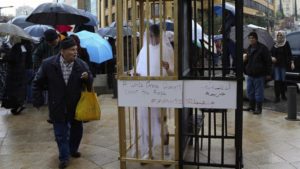
Campaigning against Article 522
Civil society organisations fought to change Article 522 that allows a rapist to marry his victim(s) to evade prosecution. Among these initiatives is the “A white dress doesn’t cover the…
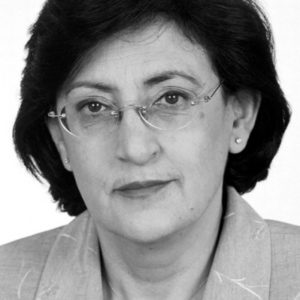
Dr. Fadia Kiwan: Contemporary academic and leading women’s rights advocate
Dr. Fadia Kiwan is the founder and former director of the Institute of Political Science at Saint Joseph University, Lebanon. She continues to be a member of the executive board…
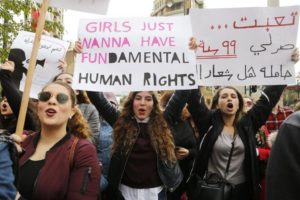
An ongoing struggle for a quota for women
The new electoral law passed in 2017 did not include a gender quota for women, a long-held demand to ensure women’s participation and representation in public office and the Parliament.…
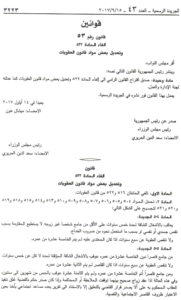
Abolishment of Article 522
16 August 2017 – Article 522 of the Lebanese Penal Code was abrogated. The French-era article allowed rapists to marry their victims to evade prosecution. Similar legislation had been abolished…
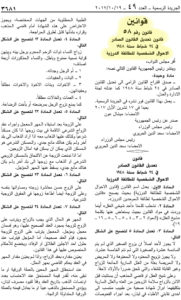
Amending the personal status law for the Druze
17 October 2017 – The personal status law issued 1948, which governs the private aspects of the Druze confession in Lebanon issued, was amended. These amendments covered several areas, including the…
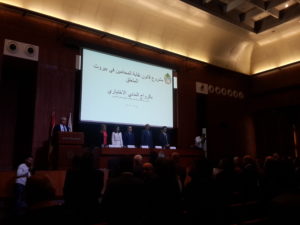
Proposing a bill to allow civil marriage in Lebanon
17 August 2017 – Even though civil marriages performed outside of Lebanon are legally accepted in the country, officiating civil marriages on Lebanese soil is not possible, due to the absence…
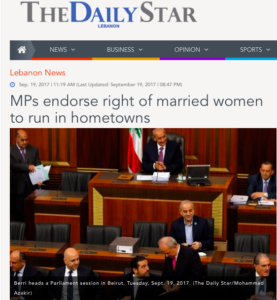
Amending the municipality candidacy conditions for married women
19 September 2017 – The Parliament passed a bill allowing married women to run for municipal office in their hometowns instead of having to run in their husbands’ hometowns. Yet, these…

Draft law to end early/child marriage
Though there is no unified minimum marriage age for women, the minimum age at marriage according to different courts ranges between 14 and 17 years, given that religious courts oversee…
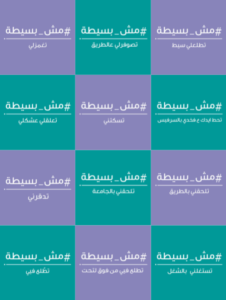
Draft Law on Sexual Harassment Approved by Parliement, Retroactively Rejected Few Minutes Later
During the January parliamentary sessions, Members of Parliament voted to pass “the draft law aiming to criminalize sexual harassment and racial discrimination” only to withdraw approval after a member complained…
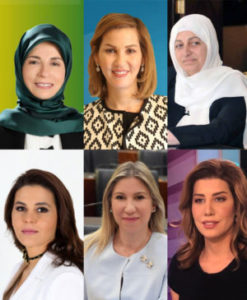
Lebanon maintains its record of 6 women elected to parliament
6 May 2018 – The 2018 elections saw a record number saw a record 113 women submit their candidacy, of which 86 were selected on electoral lists.. 77 lists presented…
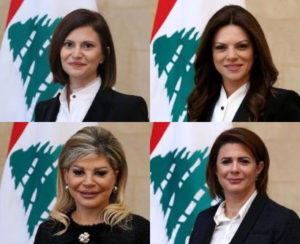
Four women appointed as ministers
31 January 2019 – Four of the thirty ministers appointed to the 2019 Government headed by Saad Hariri were women, among them the first woman to be appointed as Minister…
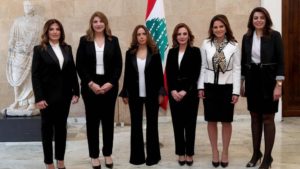
Six women appointed as ministers
21 January 2020 – Amid widespread protests and a sharply deteriorating economic situation, Hassan Diab is appointed as Prime Minister and forms a 20 Ministers government of which 6 are…
